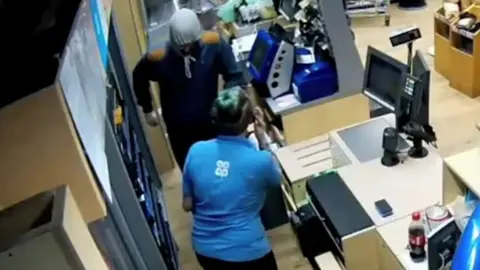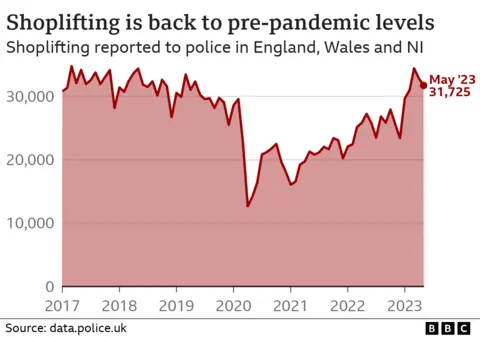Co-op warns rising crime could create 'no-go' areas for shops
 CO-OP
CO-OPThe Co-op has warned some communities could become "no-go" areas for shops due to soaring levels of retail crime.
The convenience store operator said crime in its outlets had hit record levels, increasing by more than one third over the past year.
There were about 1,000 cases of crime, shoplifting and anti-social behaviour in its shops every day in the six months to June, the chain said.
But it cited figures indicating police did not attend most retail crimes.
The Co-op said a Freedom of Information request had shown many police forces did not prioritise retail crime, with, on average, 71% of serious retail crime not responded to by police.
The National Police Chiefs' Council (NPCC) said forces were doing "everything possible to tackle offenders and support retailers in reducing shoplifting and attacks on retail staff".
But the Co-op called for an "urgent change" from the police and "for all forces to target repeat and prolific offenders to reverse the existing environment in many cities where criminal gangs operate, exempt from consequences".
Co-op Food managing director Matt Hood said retail crime was driven by "repeat and prolific offenders and, organised criminal gangs". In the worst cases, he said it could even be described as "looting".
He pointed to "horrific incidents of brazen and violent theft" in stores which left staff feeling "scared and threatened".
While the Co-op had "invested significantly" in security, he said "we need the police to play their part".
"Too often, forces fail to respond to desperate calls by our store teams, and criminals are operating in communities without any fear of consequences."
The Co-op said one of its stores in inner London was "looted" three times in one day. "This level of out-of-control crime is unsustainable and could even see some communities become a no-go area for local stores," it added.
'Terrifying'
One Co-op store manager in Leeds, David, said shoplifting had always been a problem but things had "really changed since the pandemic".
"It feels like these offenders can simply come in and take what they want - they live in our communities and do what they want, they steal your livelihood from you. They come in with bags, sacks or clothing which can conceal hundreds of pounds worth of stock - coffee, meat, spirits.
"They know the police don't have the resource or, simply can't attend quickly enough."
Zarah, a Co-op store manager in East London, said what was most frightening was when the criminals clambered over the kiosks and just tip the products into their bags.
"I have spent 20 years at Co-op, and it is worse now than ever before," she said.
"We call the police, and have been told to call '101'. It is being normalised, but colleagues are terrified, and their families are worried for them everyday they come into work."
Chief Constable Amanda Blakeman of the NPCC said police forces took any incident of violence "incredibly seriously", and would "prioritise our response where there is a risk to individuals".
"For these types of offences, police focus on targeting prolific offenders, organised crime networks, and ensuring effective prevention measures are in place."
'Dummy jars'
The Co-op figures show 175,000 instances of retail crime in the first six months of this year - a rise of 35% on the same time last year.
Earlier this year, data analysed by the BBC showed shoplifting offences had returned to pre-pandemic levels as the cost of living rose.

The figures showed that police forces in England, Wales and Northern Ireland recorded nearly 33,000 incidents of shoplifting in March - 30.9% more than March 2022.
In an effort to clamp down on such theft, some stores have been limiting the number of items on shelves, others fit the likes of steaks and cheese with security tags and replace coffee with dummy jars.
The Co-op said it believed dummy packaging would only become a more "prevalent and familiar sight" in retailing.
The chain also uses interactive and remote monitored CCTV in store, issues body-worn cameras and communication headsets for store staff, and employs covert and non-covert guards.
'Viability at risk'
Co-op campaigns and public affairs director Paul Gerrard told 5 Live's Wake up to Money the company spends £40m a year on security measures, four times the national average for convenience stores.
He said the retailer was losing significant amounts of money. "This isn't [just] a ham sandwich and a bottle of milk."
He said one store in the West Country had "the same individual target our store stealing thousands of pounds worth of product every single week".
There were stores in many big cities where "the viability of the stores is being put at risk because of the activities of criminal gangs".
Such shops were challenging to run, he said, because of the cost of keeping them open.
The bill for security and the toll taken on staff who were afraid to come to work drove up the amount it cost to "operate safely" in those stores meaning they were not making any money.
If a store became "non-viable commercially" and had to close, it risked leaving a whole community in a retail "desert", he added.

How have you been affected by the issues in this story? Email your experiences: [email protected].
Please include a contact number if you are willing to speak to a BBC journalist. You can also get in touch in the following ways:
- WhatsApp: +44 7756 165803
- Tweet: @BBC_HaveYourSay
- Upload pictures or video
- Please read our terms & conditions and privacy policy
If you are reading this page and can't see the form you will need to visit the mobile version of the BBC website to submit your question or comment or you can email us at [email protected]. Please include your name, age and location with any submission.
